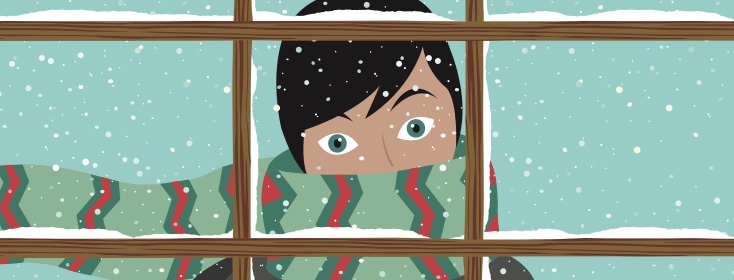How I Manage Cold Weather Symptoms
Now that temperatures in southeast Michigan have dropped, I have, once again, begun experiencing the particular symptoms cold weather brings.
Worse spasticity
Spasticity gets worse for me in cold weather. It starts in my quads—the front of the thigh - with stiffness and pain. At this point, doing stretches won’t loosen the muscles, so I lay a heating pad over the area while I sit and watch television or take a nap. If the pain isn’t relieved after an hour, then I do self-massage, pushing my thumbs along the length of the thigh, first in the middle and then on either side. Eventually, the muscle lets go and softens and the pain dissipates either completely or partially. After a day or so, that trouble area gives me no more grief — for a while, anyway. That kind of worsened spasticity goes as mysteriously as it comes. I can’t put my finger on what causes it, can’t blame the temperature completely, especially when it remains steady over several days while the spasticity suddenly disappears. But these techniques always work for me.
Muscle stiffness
Overall, muscle stiffness happens frequently in the dead of winter, especially if I’ve become more sedentary by huddling under a throw, trying to keep in some body heat. Maintaining the right climate in my little apartment is very hard since I need cold, moving air to keep my face and feet from burning up and my sinuses open. The problem with that is the rest of my body doesn’t need it that cold and appreciates more cover. The result is a stiff, aching body. My solution is to take a long, warm shower and then finish it with an oil and sugar scrub before rinsing off. The warmth relaxes everything and the scrub leaves the skin super-moisturized after toweling off, making massage go more smoothly. This is a good time for me to do more self-massage and to hit the floor and do some brief leg stretches before the muscles cool off again.
Activity, massage, and stretching all help
One important way I keep my entire body from stiffening up to the extreme is to not sit for long intervals. If I pop up every 30 minutes and do some little house chore, my muscles will stay looser longer. Note that I haven’t mentioned upping my dose of baclofen to ease the spasticity. In my experience with this muscle relaxer, more isn’t necessarily better. I’ve been taking it for six years and my body has increased its tolerance to the drug, making it necessary to up the daily dose from 20 mg in 2009 to 80 mg during the past couple of years. Activity, massage, and stretching are necessary additions to this drug therapy.
Sleep is a challenge
Another challenge is sleeping. Summer creates problems with sleep by challenging my ability to get my bedroom as cold as possible. I use a powerful pedestal fan to move the A/C-cooled air continuously across my face. But winter nights are just as challenging. Though the room is cold enough, the air is stuffy and I have to decide whether I need the fan. Sometimes it’s so damn cold that the fan is too much and will set my teeth chattering. In this case, I’ll crack open a window, and often that will be enough to move the air over my face. Despite a cold room, I can still wake in the middle of the night with a body part overheated, usually my feet. I’ll stick out one foot to cool it down, it doesn’t take long in my deep freeze of a bedroom. For some reason, I can’t fall asleep if my feet are warm. The colder they are, the better I’ll sleep.
What do you do to manage the special challenges that cold weather brings?

Join the conversation